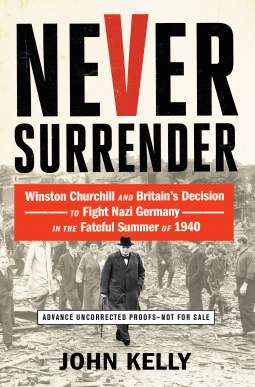
Never Surrender
Winston Churchill and Britain's Decision to Fight Nazi Germany in the Fateful Summer of 1940
by John Kelly
This title was previously available on NetGalley and is now archived.
Send NetGalley books directly to your Kindle or Kindle app
1
To read on a Kindle or Kindle app, please add kindle@netgalley.com as an approved email address to receive files in your Amazon account. Click here for step-by-step instructions.
2
Also find your Kindle email address within your Amazon account, and enter it here.
Pub Date Oct 20 2015 | Archive Date Oct 20 2015
Description
London in April, 1940, was a place of great fear and conflict. Everyone was on edge; civilization itself seemed imperiled. The Germans are marching. They have taken Poland, France, Holland, Belgium, and Czechoslovakia. They now menace Britain. Should Britain negotiate with Germany? The members of the War Cabinet bicker, yell, lose their control, and are divided. Churchill, leading the faction to fight, and Lord Halifax, cautioning that prudence is the way to survive, attempt to usurp one another by any means possible. Their country is on the line. And, in Never Surrender, we feel we are alongside these complex and imperfect men, determining the fate of the British Empire.
Drawing on the War Cabinet papers, other government documents, private diaries, newspaper accounts, and memoirs, historian John Kelly tells the story of the summer of 1940—the months of the “Supreme Question” of whether or not the British were to surrender. Impressive in scope and attentive to detail, Kelly takes readers from the battlefield to Parliament, to the government ministries, to the British high command, to the desperate Anglo-French conference in Paris and London, to the American embassy in London, and to life with the ordinary Britons. He brings to life one of the most heroic moments of the twentieth century and intimately portrays some of its largest players—Churchill, Lord Halifax, FDR, Joe Kennedy, Hitler, Stalin, and others. Never Surrender is a fabulous, grand narrative of a crucial period in World War II history and the men and women who shaped it.
Available Editions
| EDITION | Other Format |
| ISBN | 9781476727974 |
| PRICE | $30.00 (USD) |
Average rating from 5 members
Featured Reviews
 Matthew B, Reviewer
Matthew B, Reviewer
This book proved to be a remarkable look at the behind the scenes debate that was taking place during what was possibly the most difficult moment in British history, without doubt in the twentieth century. Many of us who were not alive at the time easily assume that British participation in WWII was without question and that Winston Churchill was without reproach. This book flips both of these beliefs on their heas.
Kelly's analysis of the events of 1940, specifically the summer of that year, sheds light on just how contentious the British position was following the German invasion of France and the low countries. The allied forces had been lured into a lull following the start of the war in 1939 and were overconfident in their ability to meet the threat of Hitler's armies. The rapidity with which Holland, Belgium, and France fell created a nightmare scenario in which nothing was assured. Kelly illuminates several aspects of the uncertainty that enveloped the allies at this time.
The first part of the book deals with Britain under Neville Chamberlain, and how the public and the government lost faith in him, necessitating Churchill's rise to power. The debating that took place at this time undoubtedly slowed British rearmament and hurt the defence of France when it came under attack. Once Churchill took office the debate shifted to what Britain's role would be. He was forced to deal with pressure from the French government to help them, despite the fact that it was in doubt that the British had enough forces to protect their own island, especially following the debacle of the Dunkirk evacuation.
Kelly shows that Dunkirk, and the failure of the British Expeditionary Force played a large role in the arguments between the French, who felt abandoned, and the British, who felt unable to risk more. By the time Paris fell and France surrendered there existed much tension between the two allies and this likely contributed to the terms of surrender that France accepted, especially the refusal to transfer the French fleet to British control,a decision that resulted in British bombardment of sections of their allies own warships in order to prevent them falling into enemy hands.
On a whole the book is a very illuminating look into a vital part of WWII history, one that many take for granted. I highly recommend it to anyone researching the war, and its origins.
 Reviewer 205352
Reviewer 205352
Very readable account of the decisive months of 1940.
John Kelly’s book tells the story of the decisive six months of 1940 that could have sent world history down a very different path as the members of the British War Cabinet debated whether to negotiate with Hitler or to continue the war.
The story starts with the winter of 1930/40 during the Sitzkrieg through to Hitler’s postponement of Operation Sealion. Kelly has used War Cabinet papers, other government documents, private diaries, newspaper accounts, and memoirs to
There’s nothing new here, but Kelly’s writing style removes any dryness of the subject matter and brings to life the key meeting and discussions in a compelling narrative that reads like a novel.
Recommended for anyone interested in how Churchill was right man in the right place at the right time, despite the King and many Conservative MPs who would have preferred the Foreign Secretary, Lord Halifax as Prime Minister.



